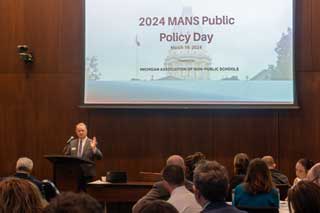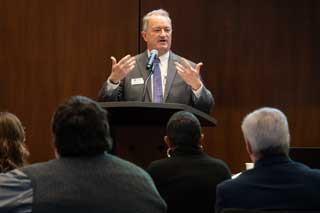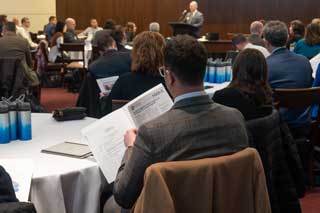Lansing Update: Local School Officials Take Advocacy for State’s Nonpublic Schools Directly to Lawmakers
Posted March 22, 2024
Nonpublic School Leaders Meet With Lawmakers to Advocate for State Budget Support
Nearly 100 Catholic and other nonpublic school leaders from across Michigan met with state lawmakers or staff this week to advocate directly for budget proposals to improve school safety, encourage more individuals to enter the teaching profession, and feed more kids in nonpublic schools.

The legislative visits were arranged by Michigan Catholic Conference (MCC) and the Michigan Association of Nonpublic Schools (MANS) as part of the annual MANS Public Policy Day held in Lansing for nonpublic school leaders.
The 80 administrators, superintendents, and school board members from Michigan’s Catholic schools, Lutheran Church-Missouri Synod schools, and Christian Schools International gathered at Heritage Hall near the Capitol Tuesday to be briefed on the top legislative issues pertaining to nonpublic schools and prepare for visits with their representatives or their staff.
In total, nonpublic school leaders met with the offices of 56 lawmakers—18 state senators and 38 state representatives.

The major policy priorities involved proposed items for next year’s state budget that pertain to nonpublic schools. MANS and MCC encouraged nonpublic school leaders to urge lawmakers to include nonpublic schools in funding programs, including an initiative to help address the teacher shortage that affects all schools, as well as another program intended to ensure all schoolchildren have access to meals.
Also at stake is funding for nonpublic schools that had previously been appropriated but was left out of the Governor’s most recent budget proposal. If the budget were enacted as is, nonpublic schools would lose funding they had previously received for school safety, robotics programs, and reimbursement for the cost of complying with state health and safety mandates.

Here’s a rundown of these budget items of concern, which will impact your local Catholic or other nonpublic school that have used these funds in the past or could benefit from additional support:
Student Teacher Stipends
The proposed K–12 budget for the 2025 Fiscal Year includes a program providing up to $9,600 per semester for students attending teacher preparation programs at public or private colleges in Michigan. However, students can receive it only if they student-teach in a public school. MCC and MANS are encouraging lawmakers to allow teachers who student teach in nonpublic schools to also qualify for the stipend.
Future Educator Fellowships
This proposal provides up to $10,000 per year for first‐time degree seekers and career changers to become a PreK–12 teacher. Students must attend public or private higher education institutions, and the fellowship would be repaid if the student does not subsequently teach at a public school for several years.
In the first year of this program, teaching at a nonpublic school was also an option for qualifying for the fellowship. Yet in this most recent budget proposal, nonpublic schools were excluded. MCC and MANS are advocating for the inclusion of the option of teaching at a nonpublic school to avoid repayment of the fellowship funding.
School Safety Funding
Despite having been included in school safety grant programs since 2015, the upcoming budget proposal eliminated nonpublic schools as funding recipients. Each of the past two budget cycles saw $18 million put toward school safety and mental health initiatives in nonpublic schools. MCC and MANS believe the state budget should promote the safety and mental health well-being of all Michigan students, regardless of where they attend school.
School Meal Program
The Governor proposed $200 million to ensure all students in schools have access to free meals. However, the funding is for public schools only and includes all students attending that school, regardless of income. The state has estimated the cost of feeding students at eligible nonpublic schools would be $1.6 million. MCC and MANS continues to advocate that nonpublic school students should be included, provided their nonpublic school participates in the federal school breakfast and lunch programs.
Robotics Programs
The state has been encouraging more opportunities for students to gain science education skills by helping schools—including nonpublic schools—participate in FIRST Robotics and Science Olympiad events and competitions. Nonpublic schools were included for funding in the current budget but were removed from eligibility in the recently proposed budget. The skills obtained in these programs are skills all students are encouraged to attain as part of a well-rounded education, and so MCC and MANS are urging lawmakers to reinstate this funding for nonpublic schools.
Health and Safety Mandate Reimbursements
The state imposes numerous health, safety, and welfare regulations upon all schools in Michigan. Public schools are compensated for these costs through state funding. Nonpublic schools have received reimbursement funds related to these costs the past few budget cycles but were not included in the recent proposal. MCC and MANS urge the restoration of these funds that are aimed at keeping Michigan students safe.
Legislation Allowing Compensated Surrogacy Contracts Approved by Senate
Despite MCC advocacy warning of the increased risk of exploitation of vulnerable women and children, the state Senate this week voted to advance legislation to allow compensated surrogacy contracts in Michigan.
The state Senate approved the compensated surrogacy contract package without any suggested changes proposed by MCC to protect against the exploitation of women. The bills—House Bill 5207 through 5215—will next be headed to the Governor, when she will likely sign them into law.
The pending removal of Michigan’s law protecting against these compensated contracts will make Michigan an outlier among the global community that has increasingly recognized surrogacy as a human rights and human trafficking concern. The United Nations issued a report finding that commercial surrogacy “often involves abusive practices,” and the European Union has previously adopted a resolution condemning the practice.
Many countries across the world prohibit surrogacy, and Pope Francis has called for a global ban on surrogacy because it is a grave violation of the dignity of the woman and the child.
MCC will continue to advocate and encourage lawmakers to consider promoting and improving alternative pathways to parenthood for those who suffer from infertility, such as adoption and foster care, and reiterates that every child—regardless of the circumstances of how he or she was conceived or born—has inherent God-given dignity.
School Safety Bills Focused on Mental Health Needs of Students Supported by MCC
MCC this week offered support for a bipartisan package of bills to better protect students from school shootings through more proactive efforts to address mental health and address concerning behaviors among students.
The House Education Committee took testimony on House Bills 4089, 4092, 4095, 4096 and 5549, all of which received MCC support. The legislation is part of a larger package of school safety bills that have been under development this session and the previous one.
The legislation up for consideration this week included measures to require schools to set up a dedicated group of people tasked with identifying and addressing concerning behavior among students. Another piece of legislation would create a new state board to work toward improving student mental health on a coordinated statewide basis.
Here’s a rundown on what each of the bills would do:
HB 4089, sponsored by Rep. Luke Meerman (R-Coopersville), would create a state School Safety and Mental Health Commission. The commission would have several duties, including identifying and supporting students at risk for behavioral health issues, strengthening the mental health of students and their families, engaging in public awareness efforts regarding mental health issues and resources, and providing recommendations to the state to improve building construction for school safety needs, among other duties.
HB 4092, sponsored by Rep. Nancy DeBoer (R-Holland) would require the state to inform local law enforcement and a school within 24 hours if it receives a tip of potential harm or criminal activity related to that school.
HB 4095, sponsored by Rep. Stephanie Young (D-Detroit), and HB 4096, sponsored by Rep. Ranjeev Puri (D-Canton), would together require the State Police to develop a standardized response plan for schools to help guide what terms schools use to respond to certain situations—such as terms like lockdown or shelter in place—and then require schools to adopt and implement that plan.
HB 5549, sponsored by Rep. Kelly Breen (D-Novi), requires public school boards to set up behavioral threat and assessment management teams, which would have duties that include defining prohibited and concerning behavior and educating the school community about when someone is at risk for potential harm to themselves or others, as well as developing a written plan to help a student who is exhibiting a concerning behavior.
U.S. Bishops Ask Nation to Pray as Supreme Court Considers Abortion Pill Case
Catholics are being asked to pray for the end of abortion and the protection of women and preborn children as the U.S. Supreme Court considers a case the U.S. bishops said could result in a similar reaction that occurred after the overturning of Roe v. Wade in 2022.
On Tuesday, March 26, the U.S. Supreme Court will hear arguments in a case that could impact the now widespread availability of abortion pills across the country. A ruling could result in the restoration of limitations that the federal Food and Drug Administration have overridden in its promotion of chemical abortion while ignoring risks to women and violating federal law, according to the U.S. Conference of Catholic Bishops (USCCB).
“In short, the FDA has enabled a nationwide mail-order abortion industry and turned neighborhood pharmacies into chemical abortion providers,” the USCCB said in making its nationwide invitation to prayer.
As a result, the U.S. bishops are calling for all Catholics to pray daily—from March 25 through June, when a ruling is expected—a prayer asking for St. Joseph’s help to defend life. It can be found below and at this link.
Dearest St. Joseph, at the word of an angel, you lovingly took Mary into your home. As God’s humble servant, you guided the Holy Family on the road to Bethlehem, welcomed Jesus as your own son in the shelter of a manger, and fled far from your homeland for the safety of both Mother and Child.
We praise God that as their faithful protector, you never hesitated to sacrifice for those entrusted to you. May your example inspire us also to welcome, cherish, and safeguard God’s most precious gift of life.
Help us to faithfully commit ourselves to the service and defense of human life—especially where it is vulnerable or threatened. Obtain for us the grace to do the will of God in all things. Amen.
